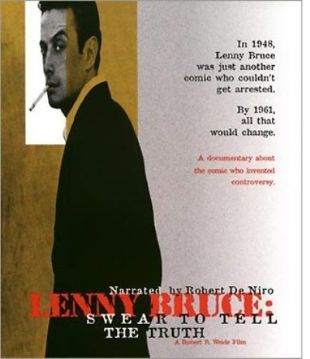It's easy to forget what a jerk Lenny Bruce could be, just as a human being, never mind his groundbreaking comedy and largely unwarranted persecution by zealous prosecutors with nothing better to do than bust a stand-up comic with a cult following. Robert Weide's film almost gives Bruce a free pass on that score in its haste to turn him into an icon of free speech. But it's not hard to see, between Honey Bruce's admission of her late husband's serial infidelity and Bruce's complicity in his martyrdom by falling prey to hard drug usage, that Lenny Bruce was no saint. Weide spent 12 years assembling this film, and it must contain every possible extant piece of footage on its subject (The Lenny Bruce Performance Film is reportedly the only full-length record of a Bruce show, and that's excerpted here), in addition to revealing interviews with the four women in his life: Sally Marr, Bruce's one-of-a-kind mother; Honey; Kitty Bruce, his grownup daughter; and Lotus Weinstock, his girlfriend at the time of his death (the film is dedicated to her and Sally, who died before it was completed). The reminiscences of comics Jackie Gayle and Frankie Raye don't add too much; it would have been nice to have some of Bruce's more recognizable contemporaries (such as Mort Sahl or Shelley Berman) on hand to lend some perspective. Steve Allen, on whose TV show Bruce probably appeared more than any other, offers an astute summary of Lenny's comedy, calling him a "highly moral commentator." Watch Bruce work out his sense of morality on-stage and then be punished for making acute observations and asking the right questions, and compare that to the slew of contemporary comics (including a number of highly paid film stars) who do what was once called toilet jokes for their own sake. It's easy to overpraise Bruce, but it's also frustrating to think how little felt his influence as a social critic is today, when there are so many targets, from misbehaving priests to hypocritical public moralists, and so few comic minds willing to take them on.

Lenny Bruce: Swear to Tell the Truth (1998)
Directed by Robert B. Weide
Share on